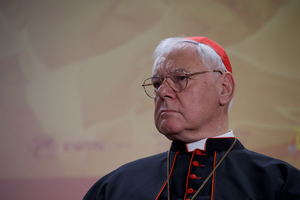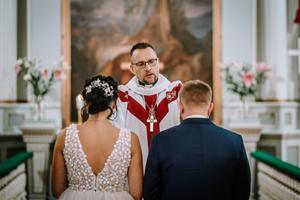Respected US Pro-Lifers Prominent Among Latest Pontifical Academy for Life Appointments
But some of the other people appointed have generated concern, in terms of their commitment to elements of Church teachings on life issues and their wish to revise Bl. Paul VI's encyclical, Humanae Vitae.

VATICAN CITY — The Pontifical Academy for Life appointed a new board of directors as well as nearly 100 “corresponding members” in early August, re-appointing many solidly pro-life members, but also choosing some new ones who appear to have less orthodox interpretations of the Church’s moral teaching on key issues.
The academy announced Aug. 3 the new board of directors, known as the “governing council,” led by the academy’s president, Archbishop Vincenzo Paglia, and the academy’s chancellor, Msgr. Renzo Pegoraro.
It also published Aug. 4 the names of 89 “corresponding members,” most of whom have been reappointed after their terms were summarily and unexpectedly ended in December 2016, with the exception of 28 who are new to the academy and 13 new researchers who are under the age of 35.
The pontifical academy, founded by Pope St. John Paul II and professor Jérôme Lejeune in 1994, is dedicated to promoting the Church’s consistent life ethic and carries out research on bioethics and Catholic moral theology.
Over the years it has promoted and developed the Church’s teaching on various areas of medical ethics, including procreation, in vitro fertilization, gene therapy, euthanasia and abortion.
The latest appointments follow the more important selection of 45 ordinary and five honorary members announced June 13 who, for the first time, included a Jewish and an Islamic scholar as well as an Anglican pastor, professor Nigel Biggar of Oxford University.
Biggar’s selection, made on the advice of Archbishop of Canterbury Justin Welby, drew criticism due to his public support for abortion up to 18 weeks and for his views on euthanasia, which do not align with Catholic teaching.
The Governing Council
The newly appointed six-member governing council is mostly made up of scholars who have already served as members of the academy, such as Japanese economics professor Etsuko Akiba of the University of Toyama; Auxiliary Bishop Alberto Germán Bochatey, who also teaches bioethics at the Argentinian Catholic University of La Plata; and Dr. Mónica López Barahona, director of the Jérôme Lejeune Chair of Bioethics in Madrid.
A newcomer is professor Adriano Pessina, a moral philosopher and director of the Center for Bioethics at the Catholic University of the Sacred Heart in Milan.
Also new to the governing council is Msgr. Carlos Simon Vazquez, a former undersecretary of the Pontifical Council for the Family. As an official of the new Vatican Dicastery for Laity, Family and Life, he is automatically awarded a seat on the governing council.
Similarly, the president of the Pontifical John Paul II Institute for Studies on Marriage and the Family is automatically given a seat on the board. Appointed as president last year by Pope Francis, Msgr. Pierangelo Sequeri is not a moral theologian but a specialist in aesthetic theology and musicology. He was allegedly one of the organizers of the controversial “Study Day on Pastoral Practice Concerning Marriage and the Family,” or what became known as a “secret synod” at the Pontifical Gregorian University in Rome May 25, 2015. The event was sponsored by the presidents of the bishops’ conferences of Germany, France and Switzerland.
Writing in L’Homme Nouveau July 18, the respected French philosopher Thibaud Collin said the goal of this congress was to “reflect on the means of relaxing the norms of conjugal morality.”
According to the pontifical academy’s new statutes, the governing council votes on the general direction of the academy, chooses corresponding members and approves study programs. Archbishop Paglia revised the statutes last year reportedly to incorporate Pope Francis’ Curial restructuring. The statutes no longer demand members sign a statement attesting to their fidelity to the Church’s teaching.
The new regulations state that ordinary members must be proven scholars who can present scientific studies to the academy, vote in assemblies, and have the right to propose to the governing council appointments and subjects for study and research. Corresponding members who are academicians have the same duties but, unlike the ordinary members, can only serve a maximum of two five-year terms.
Reappointed Americans
The majority of new corresponding members are Italians, and a good number with academic and professional backgrounds outside bioethics. They include Francesco Profumo, a former Italian minister of education and an acquaintance of Archbishop Paglia; Licia Sbattella, an associate professor of natural language processing from Milan Polytechnic Institute; and physicist Roberto Cingolani, an authority in the ethics of robotics.
Also on the list are several Argentinians, including professor Graciela Moya, a specialist in genetic epidemiology at the Pontifical Catholic University of Argentina, whose rector is Archbishop Victor Manuel Fernandez, a close adviser to Pope Francis.
Two specialists in ecology are also new corresponding members: Prinz Felix zu Lowenstein, a German specialist in the organic food industry and a Knight of Malta, and David Tilman, ecology professor at the University of Minnesota.
The reappointed corresponding members include some respected and well-known American scholars and pro-life figures, such as Maureen Condic, associate professor of neurobiology and anatomy at the University of Utah School of Medicine; Vicki Thorn, executive director of the National Office of Post-Abortion Reconciliation and Healing and founder of Project Rachel, the U.S. Catholic Church’s ministry to those affected by abortion; Richard Doerflinger, former associate director of the U.S. bishops’ Pro-Life Secretariat; and Christopher Kaczor, professor of philosophy at Loyola Marymount University.
In Aug. 16 comments to the Register, Kaczor said he was “delighted” to learn of his reappointment and hopes as a member to serve the Church “by making more widely known and convincing to others the Church’s teaching on the inherent dignity of all human beings.”
Another new corresponding member is David Albert Jones, director of the Anscombe Bioethics Center in Oxford, England. An adviser to the bishops of England and Wales on bioethics and particularly end-of-life issues, Jones last month wrote an article on the Charlie Gard case for the Register.
Role of Humanae Vitae
But a number of newly appointed members question Church teaching, particularly on contraception. This is of particular significance as the Church prepares to mark the 50th anniversary of Humanae Vitae next year and the Vatican has created a commission to study and deepen an understanding of Blessed Paul VI’s encyclical. Critics such as the French philosopher Collin are concerned it will present “a change of paradigm” that could weaken the impact of the Church’s condemnation of contraception made 50 years ago.
Msgr. Sequeri, for example, wrote the introduction of the Italian edition of a new book entitled Amoris Laetitia: A Turning Point for Moral Theology, edited by Stephan Goertz and Caroline Witting, in which it is argued that Amoris laetitia represents a paradigm shift for all moral theology and especially in interpreting Humanae vitae.
Other new academy members who hold similar positions include French Jesuit Father Alain Thomasset and Argentinian Jesuit Father Miguel Yanez, who both attended the controversial May 2015 conference.
The conference proceedings, published later, revealed a push toward the Church accepting same-sex unions, or as New York canonist Father Gerald Murray wrote, “the redefinition of sin,” by removing the notion of intrinsically evil acts.
Father Thomasset, a moral theologian and member of the Centre Sèvres in Paris, told the Rome conference that the “interpretation of the doctrine of acts called ‘intrinsically evil’ seems to me to be one of the fundamental sources of the present difficulties in the pastoral care of families, since it underlies to a great extent the condemnation of artificial contraception, of the sexual acts of the divorced and remarried and of homosexual couples, including stable ones. This appears to many as incomprehensible and seems pastorally counterproductive.” He added that a “homosexual relationship lived in stability and fidelity can be a path of holiness.”
A third participant of that conference, French Biblicist Anne-Marie Pelletier, was appointed an ordinary member of the academy in June.
Added to these is Jesuit Father Carlo Casalone, a former Italian provincial of the Society of Jesus who now heads the Cardinal Carlo Martini Foundation. Cardinal Martini, the former archbishop of Milan, who died in 2012, was well-known for his opposition to Humanae Vitae, accusing it of causing “serious damage” by prohibiting artificial contraception, and blaming Pope St. John Paul II for following its “rigorous application.”
Father Casalone declined to comment on whether he supported Cardinal Martini’s views, telling the Register there are “a few presuppositions that need further clarification and the gathering of more data,” for which he needed more time.
These appointments follow similar ones in June. Father Maurizio Chiodi, who was then appointed an ordinary member, is a key figure in the new Vatican commission that is studying Humanae Vitae, according to Archbishop Paglia. Father Chiodi believes that the use of “artificial birth-control techniques can be moral” and that the “conscience of the spouses” is that which “determines the morality.”
Other new members, however, have shown strong support for Humanae Vitae. Kaczor, for example, said that in his books The Seven Big Myths About Marriage and The Seven Big Myths About the Catholic Church, he put forward the notion that the Church’s teaching is “sometimes misunderstood because some people don’t understand the value of procreation.”
“If someone did not think that the truth was valuable, it would be hard to help them see why lying is wrong,” he told the Register. “In a similar way, if someone did not think that procreation was valuable, it would be hard to help them see why the Church teaches that contraception is wrong.”
Academy’s Commitment
The approaches to the Church’s teaching of some new members give rise to the question of how they can abide by the academy’s new statutes, particularly Article 5 (b), which states: “New academicians commit to promoting and defending the principles related to the value of life and the dignity of the human person, interpreted in a way that conforms with the magisterium of the Church.”
Asked to square this seeming inconsistency, Archbishop Paglia told the Register July 4 that the academy “trusts its members” and “knows that the Church’s teaching about life is advanced by, though not dependent on, each member of the academy.”
He said he hopes new members will strengthen dialogue with the media so that it avoids “sensationalism,” that people who love life will “come to trust the academy’s commitment,” and that none of its members is “looking to weaken the Church’s magisterium in any way.”
Edward Pentin is the Register’s Rome correspondent.
- Keywords:
- edward pentin
- pontifical academy for life

















